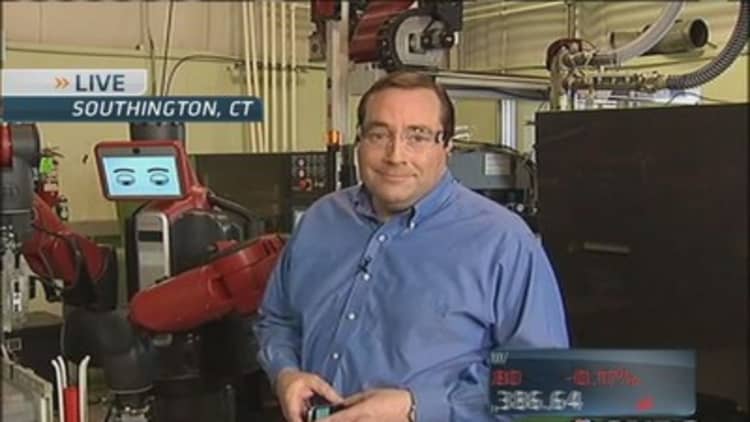
Life for small manufacturers has never been easy. Thin margins, battling the trend toward cheaper offshore operations and trying to keep up with the latest technologies are just a few issues mom-and-pop manufacturers have been wrestling with for the last 20 years.
Now, these shops are on the cusp of turning to new, low-cost and more versatile robots, in hopes of increasing their productivity and bottom line.
One of those shops, Vanguard Plastics in Southington, Conn., has put a robot named Baxter in its plant to work side by side with some of the 22 people on its floor.
(Read more: Amazon drones' new rival)
"We've always had the latest technology," said Larry Budnick Jr., who owns Vanguard. "We run our business on a productivity index, and the more one person can do by this freeing up a job, they can do something else. That increases our productivity."
Sold by Massachusetts-based Rethink Robotics, Baxter is the first in a wave of robots expected to change small manufacturing.
Taking jobs away from people?
The question is whether Baxter and other low-cost robots are so efficient that they ultimately lead to companies replacing humans, or expanding operations without hiring more workers.
At Vanguard, Baxter helps load small packaging cups into plastic bags, which are eventually shipped to a customer. With two eyes below a camera on a small screen, and two arms that can be programmed to do myriad tasks, Baxter is not far from being just another worker on the floor.
(Read more: Goodbye, mouse. Here come eye-controlled machines)
Except that he's not.
In fact, he could be seen by some of the workers as a machine taking away a job they used to do at this plant.
Scott Eckert, CEO of Rethink Robotics, said the concerns about robots taking people's jobs is overstated.
"We think of Baxter as a workforce multiplier. Baxter paired up with American workers means the overall output of the productivity of that factory goes up," he said.
But not everyone agrees.
They point out that U.S. manufacturers have added just 568,000 jobs since January of 2010. That comes after manufacturing companies cut almost 6 million jobs during the previous decade.
Erik Brynjolfsson, co-author of the "The Second Machine Age," said the pace of technological change will only accelerate in the decade.
"The economic disruption that we have seen in the past 10 years is really just a small glimmer compared to what we will see in the next 10 years," Brynjolfsson said. "If we do it right, it will be mostly a good story. We will have much better health, we will be able to solve a lot of economic problems that we couldn't have solved before, but it is not going to be a smooth ride."
(Read more: Drones to take off at six FAA sites)
At Vanguard Plastics, 24-year veteran Mildred Martinez said she doesn't mind working with Baxter.
"The kind of stuff he does is faster than having an operator here," she said.
Rafaela Ventura, who has been with the company 18 years, agreed.
"At the beginning I was kind of nervous, but now I like it, I got used to it," she said. "I have extra time now to do other stuff."
Budnick, who paid $25,000 for Baxter, said he would have paid more. The robot has increased his company's productivity so he can bid on more jobs—and hire more employees to meet increased demand.
"We're going to be bringing on one or two more people because we have a new auto industry program," he said.
For small shops like Vanguard, robots are the wave of the future. In fact, Budnick said the company plans to order two or three more Baxters from Rethink Robotics.
In his opinion, robots are the key to small manufacturers surviving in an increasingly competitive global market. As for those manufacturing companies that scoff at his use of a low-cost robot, he warned, "If they don't start using Baxter or a robot like Baxter, they're going to be left behind."
—By CNBC's Phil LeBeau. Follow him on Twitter @LeBeauCarNews.





